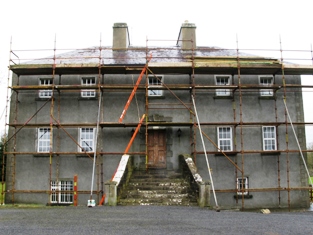Thomastown
Houses within 5km of this house
Displaying 11 houses.
Houses within 5km of Thomastown
Displaying 11 houses.
| House name | Description | |
|---|---|---|
| Moore Hall | Built in 1795 and burnt down in 1923. The residence of George Henry Moore, MP, at the time of Griffith's Valuation, when it was valued at £45. Slater refers to it as the seat of George A. Moore in 1894. The ruin is now owned by Coillte Teoranta. |

|
| Castlecarra | Granted to Sir Henry Lynch after the Restoration, it was the family's main home in county Mayo for much of the 18th century. In 1786 Wilson refers to Castle Carra as the seat of Mr. Lynch. The mansion house and offices at Castlecarra were described in 1844 by Samuel Nicholson as "now almost ruins". Castlecarra was leased to the Brownes of Castlecarra at this time and was part of their property for sale in 1852. The ruins of the original tower house are still extant but much of the surroundings are now covered by forestry. | |
| Mount Pleasant | Home of George Mahon in 1814 and of Charles G. Mahon in the 1850s when the house was valued at over £22. It is no longer extant. | |
| Ballinafad | Bence Jones states that the house was built in 1827 and was sold to the African Missionary Brothers circa 1908 by Lieutenant Colonel Llewellyn Blake of Ballinafad and Cloghballymore, county Galway. It is recorded as his seat in 1894. The Irish Tourist Association File states that the house was donated to the African Missionary Brothers by Colonel Blake and that a new wing was added in 1932. For sale in 2012. |

|
| Bridgemount House (Drum) | The home of the Acton family in the 19th century and the seat of G.H.Acton in 1894. At the time of Griffith's Valuation it was held in fee by George Acton and valued at £10. It was later the home of the Coyne family and is still extant and occupied. |

|
| Carnacon House | Home of the McDonnell family in the early 19th century and probably earlier as local sources suggest General James McDonnell, who fought in the 1798 Rebellion, was born there. In 1844 described by Samuel Nicholson as "neat and comfortable, prettily situated upon the lake and ornamented by thriving plantations". It was purchased by the Hughes family in the 1940s and is still in their possession. |

|
| Castlelucas | A house belonging to the Blakes of Ballinafad, let to Lieutenant Hugh Ryan in 1814 and to Mrs Phibbs in the 1830s who subleased to George Ormsby of the Ballinamore family. At the time of Griffith's Valuation, it was leased by Matthew Phibbs from Mark Blake and valued at £5. It is no longer extant. | |
| Clogher | According to Bence Jones this house was built circa 1798 though Wilson refers to a house at Clogher as the seat of Patrick Lynch in 1786. In 1844 Samuel Nicholson described Clogher House as "amongst the largest and the best in the Country, and appears to be kept in excellent order". Patrick C. Lynch was leasing it from Sir Robert H. Blosse at the time of Griffith's Valuation, when it was valued at £40. It was in the ownership of the Fitzgerald Kenney family at the beginning of the 20th century and is now a ruin. |

|
| Fortlawn Cottage | William Mulrooney held this property in fee at the time of Griffith's Valuation when it was valued at £5. It is labelled as Fortlawn Cottage on both the 1st and 25-inch edition Ordnance Survey maps. A house is still extant at the site. | |
| Towerhill | A late 18th century house, occupied by the Blakes until the mid 20th century, now a ruin. 1n 1894 Slater refers to it as the seat of Colonel Maurice Blake. It was valued at £60 at the time of Griffith's Valuation, when it was occupied by Valentine O'Conor Blake. |

|
| Castleburke | A home of the Bourke family and their descendants. Occupied by Patrick Horan in 1814 and from 1821 James Tuohy was the tenant. The castle was in ruins by the time of the first Ordnance Survey circa 1838. It is now owned by Eamonn de Burca. |

